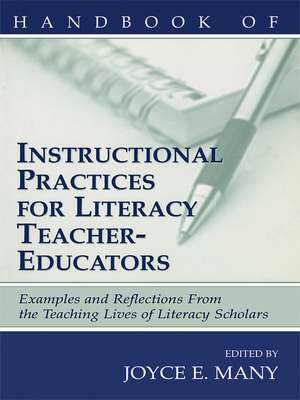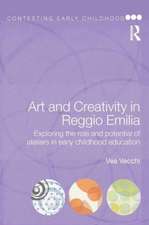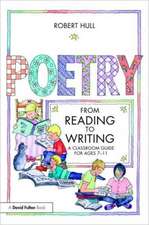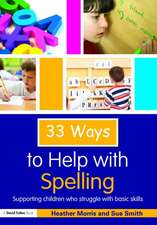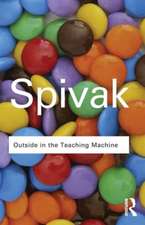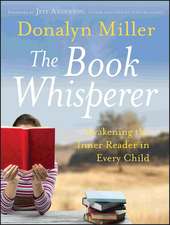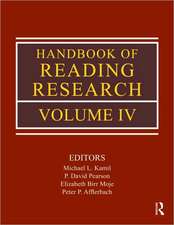Handbook of Instructional Practices for Literacy Teacher-educators: Examples and Reflections From the Teaching Lives of Literacy Scholars
Editat de Joyce E. Manyen Limba Engleză Paperback – 2001
The book is organized by areas within literacy education: reading; English/language arts; literature; emergent literacy; content-area literacy; literacy assessment and instruction; literacy and technology; and inquiries into literacy, theory, and classroom practice. It is accompanied by an interactive Web site: http://msit.gsu.edu/handbook. This online resource provides additional information about the authors' courses including complete syllabi, recommended readings, grading rubrics, and sample assignments. Readers are invited to respond and contribute their own syllabi and teaching experiences to the discourse generated by the volume.
| Toate formatele și edițiile | Preț | Express |
|---|---|---|
| Paperback (1) | 572.59 lei 6-8 săpt. | |
| Taylor & Francis – 2001 | 572.59 lei 6-8 săpt. | |
| Hardback (1) | 1465.23 lei 6-8 săpt. | |
| Taylor & Francis – 18 iul 2016 | 1465.23 lei 6-8 săpt. |
Preț: 572.59 lei
Preț vechi: 902.16 lei
-37% Nou
Puncte Express: 859
Preț estimativ în valută:
109.57€ • 114.63$ • 91.02£
109.57€ • 114.63$ • 91.02£
Carte tipărită la comandă
Livrare economică 03-17 aprilie
Preluare comenzi: 021 569.72.76
Specificații
ISBN-13: 9780805831108
ISBN-10: 080583110X
Pagini: 398
Dimensiuni: 152 x 229 x 24 mm
Greutate: 0.64 kg
Ediția:New.
Editura: Taylor & Francis
Colecția Routledge
Locul publicării:Oxford, United Kingdom
ISBN-10: 080583110X
Pagini: 398
Dimensiuni: 152 x 229 x 24 mm
Greutate: 0.64 kg
Ediția:New.
Editura: Taylor & Francis
Colecția Routledge
Locul publicării:Oxford, United Kingdom
Public țintă
ProfessionalRecenzii
"Provides a glimpse into the teaching approaches and thinking of some well-known literacy teacher educators....The choice of contributors is impressive....I need this book for my personal library."
—Janet Richards
University of Southern Mississippi
"A valuable resource tool for both the novice and experienced literacy educator....When the contributors talk about the way they organize and teach their classes, develop goals for their students, and describe the problems they struggle with, they provide a more complete picture of the professor at work. Teaching excellence doesn't happen overnight. The accounts describe the process by which professors grow and learn through continuous evaluation of their instruction."
—Marcia Popp
Southern Illinois University-Edwardsville
"All literacy scholars will want to purchase this book. It will serve as a guide for new instructors, a tool for self-reflection and revision for established instructors, and an excellent resource book for doctoral literacy courses."
—Elizabeth K. Wilson
University of Alabama
—Janet Richards
University of Southern Mississippi
"A valuable resource tool for both the novice and experienced literacy educator....When the contributors talk about the way they organize and teach their classes, develop goals for their students, and describe the problems they struggle with, they provide a more complete picture of the professor at work. Teaching excellence doesn't happen overnight. The accounts describe the process by which professors grow and learn through continuous evaluation of their instruction."
—Marcia Popp
Southern Illinois University-Edwardsville
"All literacy scholars will want to purchase this book. It will serve as a guide for new instructors, a tool for self-reflection and revision for established instructors, and an excellent resource book for doctoral literacy courses."
—Elizabeth K. Wilson
University of Alabama
Cuprins
Preface, Joyce E. Many; Part 1 Reading; Chapter 1 Two Views Presentations:, Donna L. Wiseman; Chapter 2 Matching Standards With Substance:, Susan L. Pasquarelli, Rachel L. McCormack; Chapter 3 Social Foundations as a Foundation for Literacy Instruction:, Sally M. Oran, Kathleen Bennett deMarrais, Jamie B. Lewis; Chapter 4 Comprehension of Text:, Victoria Purcell-Gates; Chapter 5 Book Club Workshop:, Taffy E. Raphael; Part 2 English/Language Arts; Chapter 6 Teaching of Communication Arts, Jane West; Chapter 7 Writing Buddies:, Donna Cooner, Donna L. Wiseman; Chapter 8 Whole Language Teaching in Elementary and Middle School, JoBeth Allen; Chapter 9 Teaching and Learning in the English Language Arts, Nancy Farnan; Chapter 10 Preservice Secondary Language Arts Teaching Methods, Peter Smagorinsky; Chapter 11 Oral and Written Communication, Peggy Albers; Chapter 12 Teaching of Writing as Story, David Schaafsma; Part 3 Literature and the Teaching of Literature; Chapter 13 The Art of the Picture Book, Kathy G. Short, Cheri Anderson; Chapter 14 Children's Literature in the Curriculum, Lee Galda; Chapter 15 Mediating Multicultural Children's Literature, Patricia E. Enciso; Chapter 16 Teaching Multicultural Literature:, Violet J. Harriss; Chapter 17 Adolescent Literature and the Teaching of Literature, Robert E. Probst; Part 4 Emergent Literacy; Chapter 18 Literacy Development in the Early Years:, Lesley Mandel Morrow; Chapter 19 Research and Theory for Constructivist Leadership in Early Childhood Education, Mona W. Matthews; Chapter 20 Initial Encounters With Print:, David B. Yaden Jr., Cubillas; Part 5 Content Area Literacy; Chapter 21 Reading for Secondary Teachers, Carol V. Lloyd; Chapter 22 Secondary Content Area Reading, Victoria Gentry Ridgeway; Chapter 23 Content Area Literacy, Thomas W. Bean; Part 6 Literacy Assessment and Instruction; Chapter 24 Assessment and Instruction in Literacy Courses and a Tutoring Practicum, Penny A. Freppon; Chapter 25 The Analysis and Correction of Reading Disabilities, Steven A. Stahl; Chapter 26 Learner-Centered Assessments for Preservice Classroom Teachers, Robert J. Tierney, Lora Lawson, Elizabeth Murray; Part 7 Language and Literacy in a Diverse Society; Chapter 27 Reading:, Jim Hoffman, Rachel Salas, Beth Patterson; Chapter 28 Language and Learning, James Marshall; Chapter 29 Creating a Common Project in the Study of Diversity, Michael W. Smith; Chapter 30 Methods and Materials for the Bilingual—English as a Second Language Teacher, Ruth A. Hough; Part 8 Literacy and Technology; Chapter 31 Computer-Based Instruction in Reading Education, Linda D. Labbo, David R. Reinking; Chapter 32 Topics in Computer-Based Reading and Writing, David Reinking; Part 9 Inquiries into Literacy, Theory, and Classroom Practice; Chapter 33 Action Research in Educational Settings:, Leslie Patterson; Chapter 34 Creating Curricular Invitations:, Christine H. Leland, Jerome C. Harste; Chapter 35 History of American Reading Instruction, James V. Hoffman; Chapter 36 Negotiating a Syllabus for a Doctoral Course in the Psychology and Pedagogy of Literacy, Richard E. Ferdig, P.David Pearson; Chapter 37 Trends and Issues in Literacy:, Joyce E. Many;
Descriere
Offers a unique glimpse into the teaching approaches & thinking of a wide range of well-known literacy researchers, & the lessons learned from their teaching lives. Each chapter includes a syllabus for a course the author has taught & personal reflection
